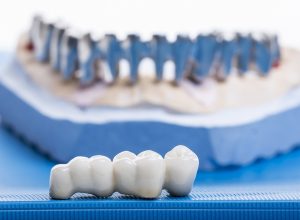Missing teeth negatively impacts your life in various ways. You might face speech difficulties, you have to avoid certain foods due to the discomfort they cause you while eating, or be vulnerable to disease as the bacteria in your mouth multiply. But with advancements made in dentistry in the past couple of decades, you can regain your smile and confidence with replacement teeth.
While there are options from which you can choose, including dentures and bridges, some of their disadvantages are inconvenient for the wearer. Dentures have the tendency of making their presence known by slipping and clicking as you speak, which may be embarrassing for some. At the same time, while bridges are fixed, unlike dentures, they require extreme maintenance and care in their upkeep.
Dental implantology is fast becoming a popular choice because they do not possess the same shortcomings that alternative teeth replacements have – implants are fused to the jawbone, making them irremovable, and require the same attention as a natural tooth, in terms of brushing and flossing.
What is it?
When a tooth is lost and left untreated, the jawbone suffers because the pressure of a tooth, which usually stimulates it as you talk, eat and chew, is absent. A lack of exercise leads to atrophy, and in turn, avoidable bone loss that changes the shape of your mouth.
A distinct advantage of dental implants is that the tooth is replaced at the root with a titanium screw that exerts similar pressure to that of a normal tooth, something that is absent when considering alternative methods of tooth replacement.
Is this the right type of tooth replacement for me?
You are eligible for implants whether you have one or many teeth missing, but there are certain conditions you should be made aware of.
You need healthy gums and enough bones to keep the implant in place, as well as being committed to oral health and hygiene. While these implants do not require you to input extra work and effort in terms of teeth-cleaning habits, like with any normal teeth, they are not guaranteed to last a lifetime if not properly cared for.
Can implants fail?
With close to a 98% success rate, implants rarely fail, but when they do it is because the tooth dislodged during healing. Other reasons which are even more uncommon include allergies to titanium.
Titanium is a metal used in many surgeries and procedures because it is recognised as part of the body and not as a foreign object, so the chances of it being rejected are slim. However, in the case of the allergy mentioned above, it can happen.
Am I likely to experience pain or discomfort?
Usually, anaesthesia is used to numb your pain as the screw is injected into the jaw, so it is highly unlike you will feel anything during the procedure. But you might experience some discomfort once the anaesthesia has worn off. Ask your dentist to recommend a painkiller if you are concerned.
Are you tired of missing out on social events because you are worried about what people might think of your missing tooth or unreliable dentures? Gain peace of mind and your life back with implantology!


